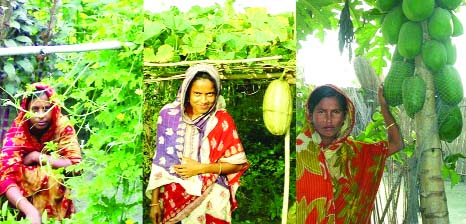
Mamun Islam, BSS, Rangpur :
Homestead vegetable cultivation has been improving socio-economic and nutritional status of one lakh 33 thousand extremely poor char households on the Brahmaputra basin braving adverse climate change impacts in recent years.
“The char households have become self-reliant through homestead vegetable gardening and selling the extra produce after meeting their own nutrition,” said Agriculture and Environment Coordinator Mamunur Rashid of RDRS Bangladesh.
The char people have achieved the success in ten northwestern riverine districts by adapting to climate change impacts and cultivating vegetables on tiny homesteads along with other income generating activities to lead better and healthier life.
“The Char Livelihoods Programme (CLP) extended assistance to the families from 2004 to 2016 to make them self-reliant through various income generation activities under adverse situations,” said Mamun of the NGO, one of the implementation partners of CLP.
The UKaid through the Department for International Development and Australian Government through Australian Agency for International Development supported for implementation of the comprehensive CLP activities, he added.
Horticulture Specialist of the Department of Agriculture Extension Khondker Mesbahul Islam said char people are cultivating pumpkin, sweet gourd, ‘Korola’, chilli, ‘Chichinga’, ‘Borboti’, ‘patol’, ‘Kakrol’, ‘Jhinga’, ‘Shosha’, bottle gourd, brinjal, cauliflower, ‘Palong’, ‘Lal sak’ and other vegetables.
“Successful implementation of CLP through GO-NGO collaboration by last year helped the extremely poor char households to alleviate poverty and improve their livelihoods,” he said.
Under the CLP, vegetable farming helped five lakh people of the beneficiary poor char households of Kurigram, Bogra, Lalmonirhat, Pabna, Gaibandha, Sirajganj, Jamalpur, Nilphamari, Rangpur and Tangail districts to overcome poverty.
Chilmari upazila chairman Shawkat Ali Sarker, Bir Bikram, said the char people have sustainably improved livelihoods through homestead vegetable cultivation along with animal husbandry and other income generation activities.
Editor of the Weekly Juger Khabar being published from Chilmari SM Nurul Amin Sarker said the char households have achieved success in vegetable farming on their raised plinths after escaping floods with CLP assistance.
Talking to BSS, CLP beneficiaries Kohinoor Begum, Noorjahan, Bulbuli Begum, Sharifa and Halima of different char villages under Chilmari upazila in Kurigram narrated about the success achieved through vegetables farming on their tiny homesteads.
Chilmari Upazila Agriculture Officer Md Khaledur Rahman told BSS that the char people are leading better life adapting to adverse impacts of climate change and their children going to the schools with a brighter dream.
Homestead vegetable cultivation has been improving socio-economic and nutritional status of one lakh 33 thousand extremely poor char households on the Brahmaputra basin braving adverse climate change impacts in recent years.
“The char households have become self-reliant through homestead vegetable gardening and selling the extra produce after meeting their own nutrition,” said Agriculture and Environment Coordinator Mamunur Rashid of RDRS Bangladesh.
The char people have achieved the success in ten northwestern riverine districts by adapting to climate change impacts and cultivating vegetables on tiny homesteads along with other income generating activities to lead better and healthier life.
“The Char Livelihoods Programme (CLP) extended assistance to the families from 2004 to 2016 to make them self-reliant through various income generation activities under adverse situations,” said Mamun of the NGO, one of the implementation partners of CLP.
The UKaid through the Department for International Development and Australian Government through Australian Agency for International Development supported for implementation of the comprehensive CLP activities, he added.
Horticulture Specialist of the Department of Agriculture Extension Khondker Mesbahul Islam said char people are cultivating pumpkin, sweet gourd, ‘Korola’, chilli, ‘Chichinga’, ‘Borboti’, ‘patol’, ‘Kakrol’, ‘Jhinga’, ‘Shosha’, bottle gourd, brinjal, cauliflower, ‘Palong’, ‘Lal sak’ and other vegetables.
“Successful implementation of CLP through GO-NGO collaboration by last year helped the extremely poor char households to alleviate poverty and improve their livelihoods,” he said.
Under the CLP, vegetable farming helped five lakh people of the beneficiary poor char households of Kurigram, Bogra, Lalmonirhat, Pabna, Gaibandha, Sirajganj, Jamalpur, Nilphamari, Rangpur and Tangail districts to overcome poverty.
Chilmari upazila chairman Shawkat Ali Sarker, Bir Bikram, said the char people have sustainably improved livelihoods through homestead vegetable cultivation along with animal husbandry and other income generation activities.
Editor of the Weekly Juger Khabar being published from Chilmari SM Nurul Amin Sarker said the char households have achieved success in vegetable farming on their raised plinths after escaping floods with CLP assistance.
Talking to BSS, CLP beneficiaries Kohinoor Begum, Noorjahan, Bulbuli Begum, Sharifa and Halima of different char villages under Chilmari upazila in Kurigram narrated about the success achieved through vegetables farming on their tiny homesteads.
Chilmari Upazila Agriculture Officer Md Khaledur Rahman told BSS that the char people are leading better life adapting to adverse impacts of climate change and their children going to the schools with a brighter dream.

